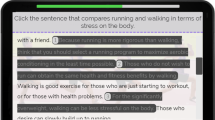Abstract
The Human Use Regulatory Affairs Advisor (HURAA) is a web-based help facility that provides training on the ethical use of human subjects in research, and that serves as an information retrieval system on ethical policies. The content for HURAA is derived from United States Federal agency documents and regulations. HURAA has a number of components that go beyond conventional page-turning or hypertext systems, including (1) an animated conversational agent that serves as a navigational guide for the web facility, (2) an enhanced multimedia introduction, (3) lessons with case-based and explanation-based reasoning, and (4) document retrieval through natural language queries or a Point & Query facility. The effectiveness of HURAA was tested on a small sample of participants (N = 18) who were assigned to either the full HURAA version or a conventional computer-based training version.
Access this chapter
Tax calculation will be finalised at checkout
Purchases are for personal use only
Preview
Unable to display preview. Download preview PDF.
Similar content being viewed by others
References
Aleven, V., Koedinger, K.R., & Cross, K.: Tutoring answer explanation fosters learning with understanding. In S.P. Lajoie and M. Vivet (Eds.), Artificial intelligence in education. Amsterdam: IOS Press (1999) 199–206
Anderson, J. R., Corbett, A. T., Koedinger, K. R., & Pelletier, R.: Cognitive tutors: Lessons learned. The Journal of the Learning Sciences 4 (1995) 167–207
Ashley, K.D.: Modeling legal argument: Reasoning with cases and hypotheticals. Cambridge, MA: MIT Press (1990)
32 CFR 219: Protection of Human Subjects, Department of Defense (1991)
Emmanuel, E. J., Wendler, D., & Grady, C.: What makes clinical research ethical? Journal of the American Medical Association 283 (2000) 2701–2711
DoD Directive 3216.2: Protection of Human Subjects in DoD supported research, Department of Defense (1993)
Fletcher, J. D.: Technology, the Columbus effect, and the third revolution in learning. In M. Rabinowitz, F.C. Blumberg, & H. Everson (Eds.), The Impact of Media and Technology on Instruction. Mahwah, NJ: Lawrence Erlbaum Associates (in press)
Graesser, A. C., Langston, M. & Baggett, W. Exploring information about concepts by asking questions. In G. V. Nakamura, R. M. Taraban, & D. Medin (Eds.), The psychology of learning and motivation: Vol. 29. Categorization by humans and machines. Orlando, FL: Academic Press (1993) 411–436
Graesser, A.C., Person, N., Harter, D., & TRG: Teaching tactics and dialog in AutoTutor. International Journal of Artificial Intelligence in Education (in press)
Graesser, A.C., VanLehn, K., Rose, C., Jordan, P., & Harter, D.: Intelligent tutoring systems with conversational dialogue. AI Magazine 22 (2001) 39–51
Graesser, A.C., Wiemer-Hastings, P., Wiemer-Hastings, K., Harter, D., Person, N., & TRG: Using latent semantic analysis to evaluate the contributions of students in AutoTutor. Interactive Learning Environments 8 (2000) 129–148
Johnson, W. L., & Rickel, J. W., & Lester, J.C.: Animated pedagogical agents: Face-to-face interaction in interactive learning environments. International Journal of Artificial Intelligence in Education 11 (2000) 47–78
Jurafsky, D., & Martin, J.H.: Speech and language processing: An introduction to natural language processing, computational linguistics, and speech recognition. Upper Saddle River, NJ: Prentice-Hall (2000)
Koedinger, K.R., Anderson, J.R., Hadley, W.H., & Mark, M.A.: Intelligent tutoring goes to school in the big city. International Journal of Artificial Intelligence in Education 8 (1997) 30–43
Landauer, T.K., Foltz, P.W., Laham, D.: An introduction to latent semantic analysis. Discourse Processes 25 (1998) 259–284
Liao, Y.C.: Effects of hypermedia on students’ achievement: A meta-analysis. Journal of Educational Multimedia and Hypermedia 8 (1999) 255–277
Mayer, R.E.: Multimedia learning: Are we asking the right questions? Educational Psychologist 32 (1997) 1–19
NIH 45 CFR 46: National Institutes of Health Code of Federal Regulations, Protection of Human Subjects (1991)
Person, N.K., Graesser, A.C., Kreuz, R.J., Pomeroy, V., & TRG: Simulating human tutor dialog moves in AutoTutor. International Journal of Artificial Intelligence in Education 12 (2001) 23–29
Protection of Human Subjects in Department of Defense
Sharable Content Object Reference Model (SCORM), Version 1.1. http://www.adlnet.org.
VanLehn, K., Jones, R.M., & Chi, M.T.: A model of the self-explanation effect. The Journal of the Learning Sciences 2 (1992) 1–59
Author information
Authors and Affiliations
Editor information
Editors and Affiliations
Rights and permissions
Copyright information
© 2002 Springer-Verlag Berlin Heidelberg
About this paper
Cite this paper
Graesser, A.C. et al. (2002). Learning about the Ethical Treatment of Human Subjects in Experiments on a Web Facility with a Conversational Agent and ITS Components. In: Cerri, S.A., Gouardères, G., Paraguaçu, F. (eds) Intelligent Tutoring Systems. ITS 2002. Lecture Notes in Computer Science, vol 2363. Springer, Berlin, Heidelberg. https://doi.org/10.1007/3-540-47987-2_97
Download citation
DOI: https://doi.org/10.1007/3-540-47987-2_97
Published:
Publisher Name: Springer, Berlin, Heidelberg
Print ISBN: 978-3-540-43750-5
Online ISBN: 978-3-540-47987-1
eBook Packages: Springer Book Archive




